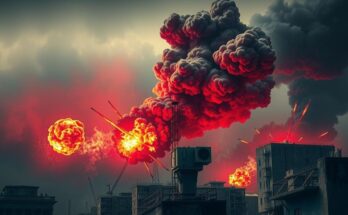Rwanda’s President Kagame concurs with the U.S. on the need for a ceasefire in Congo’s ongoing conflict, following the M23 rebel group’s seizure of Goma. Despite the agreement, Rwanda does not plan to withdraw its troops. The U.S. may urge the U.N. for intervention as tensions escalate between Congo and Rwanda amidst humanitarian crises resulting from the conflict.
Rwanda’s President Paul Kagame stated his agreement with the United States concerning the necessity for a ceasefire in eastern Congo; however, he did not indicate any intention to comply with calls for the withdrawal of Rwandan troops or the M23 rebels they support from Goma. This statement comes following the M23 rebel group’s recent capture of Goma, which has led to significant unrest and strain on local medical facilities due to injuries from the conflict.
The U.S. government has urged the United Nations Security Council to take unspecified actions aimed at halting the rebel offensive that has displaced tens of thousands. Despite some calm returning to Goma after intense fighting, sporadic gunfire continues to be reported, and many shops and homes have suffered from looting.
In a recent communication, Kagame conveyed to U.S. Secretary of State Marco Rubio the importance of establishing a ceasefire and addressing the underlying causes of this protracted conflict. Rubio expressed deep concern regarding the ongoing strife, which is rooted in the aftermath of the Rwandan genocide and the ongoing struggle for control of the Congo’s vast mineral resources.
The presence of Rwandan troops in Goma, reportedly backing the M23, has been confirmed by both the Congolese government and the head of U.N. peacekeeping. Rwanda maintains it is acting in self-defense against threats posed by Congolese militias, but has not explicitly acknowledged the presence of its forces.
During recent events, the Congolese and Rwandan armies exchanged fire as the rebels sought to secure their control over Goma, a critical hub for trade involving valuable ores. Reports from Goma describe continued sporadic gunfire and looting, with residents facing disruptions to vital services like electricity and water supply.
The M23 insurgency is part of a broader pattern of Tutsi-led, Rwandan-supported rebellions that have disrupted Congo over the last thirty years, following the Rwandan genocide. Rwanda claims that remnants of genocidal militias continue to pose a threat, while Congo accuses Rwanda of exploiting native militias to seize control of its rich mineral resources.
In response to the violence, public sentiment in Kinshasa has erupted with protests against foreign involvement, leading to attacks on U.N. facilities and embassies, including those of Rwanda, the United States, and France.
The ongoing conflict in eastern Congo, particularly in Goma, is deeply intertwined with historical events such as the Rwandan genocide of 1994. This struggle has often revolved around control over mineral resources and ethnic tensions, particularly between Tutsi and Hutu groups. The M23 rebels, primarily composed of ethnic Tutsis, have been accused of receiving support from Rwanda, leading to a cycle of violence and accusations between the two nations. International involvement, particularly from the United States and the U.N., has focused on establishing peace and addressing the underlying issues of the conflict.
The recent escalation of violence in eastern Congo has underscored the urgency for a ceasefire, as emphasized by both President Kagame and U.S. Secretary of State Rubio. Despite agreeing on the necessity for peace, Rwanda’s posture towards troop withdrawal raises questions about the stability of the region. The unrest not only impacts local populations but also illustrates the complex dynamics of regional politics, historical grievances, and resource control that continue to fuel the conflict.
Original Source: www.voanews.com




